
The men's 400 metres at the 2004 Summer Olympics as part of the athletics program were held at the Athens Olympic Stadium from August 20 to 23. Sixty-two athletes from 48 nations competed. The event was won by Jeremy Wariner of the United States, the sixth in what would ultimately be 7 consecutive American victories stretching from 1984 to 2008 and the 18th overall title in the event by the United States. The United States swept the podium for the 4th time in the event.
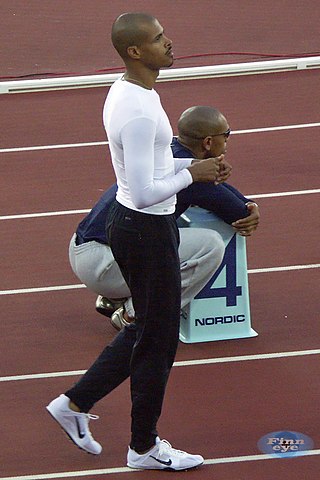
The men's 400 metres hurdles at the 2004 Summer Olympics as part of the athletics program were held at the Athens Olympic Stadium from August 23 to 26. There were 35 competitors from 24 nations. The event was won by Félix Sánchez of the Dominican Republic, the nation's first medal in the men's 400 metres hurdles. Silver went to Danny McFarlane of Jamaica, returning to the podium in the event for the first time since 1992. Naman Keïta's bronze was France's first medal in the event in over 100 years; the last Frenchman to medal in the long hurdles was Henri Tauzin in 1900. The United States' five-Games gold medal streak ended; for only the second time in the history of the event, Americans competed but won no medals.

The men's 400 metres hurdles was the longer of the men's hurdle races in the Athletics at the 1964 Summer Olympics program in Tokyo. It was held on 14 October, 15 October, and 16 October 1964. 39 athletes from 26 nations competed, with 1 more not starting in the first round. The maximum number of athletes per nation had been set at 3 since the 1930 Olympic Congress. The first round was held on 14 October, with the semifinals on 15 October and the final on 16 October. The event was won by Rex Cawley of the United States, the nation's sixth consecutive and 11th overall victory in the men's 400 metres hurdles. For the first time since 1952, the Americans did not sweep the event. John Cooper earned Great Britain's first medal in the event since 1928 with his silver; Salvatore Morale took Italy's first-ever medal in the 400 metres hurdles with his bronze.
The men's 400 metres at the 1988 Summer Olympics in Seoul, South Korea took place between 24 and 28 September 1988. Seventy-five athletes from 55 nations competed. The maximum number of athletes per nation had been set at three since the 1930 Olympic Congress. The event was won by 0.06 seconds by Steve Lewis of the United States, the second in what would ultimately be seven consecutive American victories stretching from 1984 to 2008. As of May 2024, this remains the narrowest winning margin in the event since the introduction of fully automatic timing. The United States swept the podium in the event for the third time, having previously done so in 1904 and 1968.

The men's 400 metres hurdles at the 1988 Summer Olympics in Seoul, South Korea had an entry list of 38 competitors, with five qualifying heats and two semifinals (16) before the final (8) took place on Sunday September 25, 1988. One athlete did not start, so there were 37 competitors from 28 nations. The maximum number of athletes per nation had been set at 3 since the 1930 Olympic Congress. The event was won by Andre Phillips of the United States, the nation's second consecutive and 14th overall victory in the event. Amadou Dia Ba earned Senegal's first medal in the event with his silver. Dia Ba broke up a potential American sweep, as 1976 and 1984 champion Edwin Moses took bronze and Kevin Young placed fourth. Moses was the second man to earn three medals in the event.

The men's 400 metres hurdles was an event at the 1996 Summer Olympics in Atlanta, Georgia. There were 55 competitors from 35 nations. The maximum number of athletes per nation had been set at 3 since the 1930 Olympic Congress. The event was won by Derrick Adkins of the United States, the nation's fourth consecutive and 16th overall victory in the event. Samuel Matete of Zambia earned that nation's first medal in the event with his silver. American Calvin Davis took bronze.
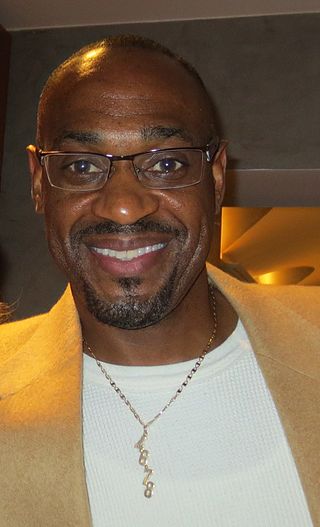
The men's 400 metres hurdles was an event at the 1992 Summer Olympics in Barcelona, Spain. It was held from 3 to 6 August at the Estadi Olímpic Lluís Companys. There were 47 competitors from 35 nations. The maximum number of athletes per nation had been set at 3 since the 1930 Olympic Congress. The event was won by Kevin Young of the United States, the nation's third consecutive and 15th overall victory in the event. Winthrop Graham earned Jamaica's first men's 400 metres hurdles medal with his silver. Kriss Akabusi earned bronze, putting Great Britain on the podium in the event for the first time since 1980. The three medalists had finished in the same order in 1988, just outside of the medals that year in fourth through sixth places.
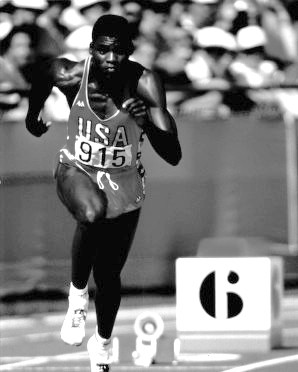
The men's 200 metres at the 1984 Summer Olympics in Los Angeles, United States had an entry list of 76 competitors from 58 nations, with ten qualifying heats (76), four quarterfinals (32), and two semifinals (16) before the final (8) took off on Wednesday August 8, 1984. The maximum number of athletes per nation had been set at 3 since the 1930 Olympic Congress. The event was won by 0.16 seconds by Carl Lewis of the United States, the nation's first victory in the men's 200 metres since 1968 and 13th overall. It was the third gold medal of the Games for Lewis, who was attempting to match Jesse Owens in winning the 100, 200, long jump, and 4x100 relay; his victory in this event left only the relay to go, in which the United States was heavily favored. The American team competed in a medal sweep in this event, the first since 1956 and the fifth overall for the United States, with Kirk Baptiste earning silver and Thomas Jefferson taking bronze.
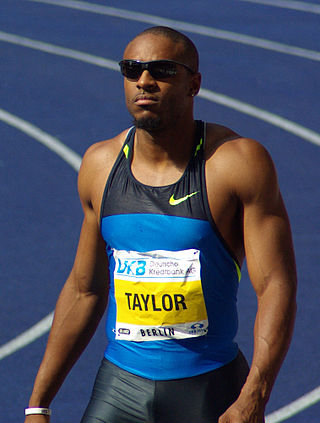
The men's 400 metres hurdles at the 2008 Summer Olympics took place on 16–18 August at the Beijing National Stadium. There were 26 competitors from 19 nations. The event was won by Angelo Taylor of the United States, the nation's 18th victory in the men's 400 metres hurdles. Taylor was the seventh man to win multiple medals in the event, and third to win two golds. The United States completed its fifth podium sweep in the men's long hurdles, as Kerron Clement and Bershawn Jackson took silver and bronze.

The men's 400 metres was an event at the 1984 Summer Olympics in Los Angeles, California. It was held from August 4 to August 8. Eighty athletes from 56 nations competed. The maximum number of athletes per nation had been set at 3 since the 1930 Olympic Congress. The event was won by 0.27 seconds by Alonzo Babers, returning the United States to the top of the podium for the first time since 1972. Gabriel Tiacoh won the Ivory Coast's first Olympic medal in any event, with a silver.
The men's 400 metres was an event at the 1980 Summer Olympics in Moscow. The competition was held from July 27 to July 30, 1980. Fifty athletes from 32 nations competed. The maximum number of athletes per nation had been set at 3 since the 1930 Olympic Congress. The event was won by 0.24 seconds by Viktor Markin of the Soviet Union, the nation's first title in the men's 400 metres and first medal in the event since 1956. With the United States boycotting the Games, the country was not represented on the podium for the first time since 1920. Australia earned its first medal in the event with Rick Mitchell's silver, while East Germany won its first medal with Frank Schaffer's bronze, which was the first medal by any German since the United Team took silvers in 1956 and 1960.

The men's 110 metres hurdles at the 1980 Summer Olympics in Moscow, Soviet Union had an entry list of 23 competitors from 16 nations, with three qualifying heats and two semifinals (16) before the final (8) took place on Sunday 27 July 1980. The maximum number of athletes per nation had been set at 3 since the 1930 Olympic Congress. The event was won by Thomas Munkelt of East Germany, the first medal by a German runner in the event. Alejandro Casañas of Cuba took silver for the second Games in a row, making him the eighth man with two medals in the event. Aleksandr Puchkov's bronze was the Soviet Union's second medal in the event and first since 1964.

The men's 400 metres hurdles at the 2000 Summer Olympics as part of the athletics programme were held at Stadium Australia on Sunday 24 September, Monday 25 September and Wednesday 27 September 2000. There were 62 competitors from 45 nations. The event was won by 0.03 seconds by Angelo Taylor of the United States, the nation's fifth consecutive and 17th overall victory in the event. Saudi Arabia and South Africa each earned their first medals in the men's 400 metres hurdles, as Hadi Souan Somayli took silver and Llewellyn Herbert received bronze.

The men's 400 metres hurdles event at the 1952 Summer Olympics took place July 20–21, 1952 at the Helsinki Olympic Stadium. There were 40 competitors from 24 nations. The maximum number of athletes per nation had been set at 3 since the 1930 Olympic Congress. The final was won by American Charles Moore. It was the nation's third consecutive and eighth overall victory in the event. The Soviet Union, in its debut, and New Zealand each earned their first medal in the men's 400 metres hurdles, with Yuriy Lituyev's silver and John Holland's bronze, respectively.

The men's 400 metres competition at the 2012 Summer Olympics in London, United Kingdom, was held at the Olympic Stadium on 4–6 August. Forty-nine athletes from 38 nations competed. The event was won by 0.52 seconds by Kirani James of Grenada, earning the country its first Olympic medal. Luguelín Santos's silver was the Dominican Republic's first medal in the men's 400 metres. Lalonde Gordon's bronze was Trinidad and Tobago's first medal in the event since 1964.

The men's 400 metres hurdles competition at the 2012 Summer Olympics in London, United Kingdom took place on 3–6 August at the Olympic Stadium. There were 49 competitors from 33 nations. The event was won by Félix Sánchez of the Dominican Republic, the second victory in the men's long hurdles for both the man and the nation. Sánchez was the eighth man to win multiple medals in the event and fourth to win two golds. Michael Tinsley of the United States earned silver. Javier Culson's bronze was Puerto Rico's first medal in the event.

The men's 400 metres hurdles was an event at the 1976 Summer Olympics in Montreal. The competition was held from July 23, 1976, to July 25, 1976. There were 22 competitors from 16 nations. The maximum number of athletes per nation had been set at 3 since the 1930 Olympic Congress. American Edwin Moses won the final in a world record and Olympic record time of 47.64 seconds, winning by 1.05 seconds. His time was initially noted as one hundredth slower, but this was rounded up after an analysis of the photo finish. It was the United States' first victory in the event since 1964 and 12th overall. Fellow American Michael Shine took silver. Yevgeniy Gavrilenko earned the Soviet Union's first medal in the event since 1952 with his bronze. Great Britain's three-Games podium streak in the event ended.

The men's 400 metres hurdles at the 1984 Summer Olympics in Los Angeles, California had an entry list of 45 competitors from 30 nations, with six qualifying heats and two semifinals (16) before the final (8) took place on Sunday August 5, 1984. The maximum number of athletes per nation had been set at 3 since the 1930 Olympic Congress. American Edwin Moses won his second Olympic gold medal after 1976, while his 18-year-old teammate Danny Harris took the silver medal. Moses' gold was the United States' 13th victory in the event. He became the sixth man to win multiple medals in the event, and the second to win multiple golds. Harald Schmid of West Germany took bronze, giving the nation its first medal in the 400 metres hurdles since 1968.
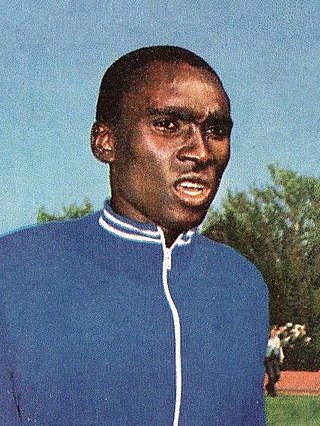
The men's 400 metres hurdles was an event at the 1972 Summer Olympics in Munich. The competition was held on 31 August - 2 September. There were 37 competitors from 25 nations. The maximum number of athletes per nation had been set at 3 since the 1930 Olympic Congress. The event was won by John Akii-Bua of Uganda, the nation's first medal in the event and first gold medal in any Olympic event. Ralph Mann returned the United States to the podium after a one-Games absence with his silver medal, while David Hemery added a bronze to his 1968 gold to become the fifth man to earn multiple medals in the event while extending Great Britain's podium streak in the 400 metres hurdles to three Games.

The men's 400 metres hurdles event at the 2016 Summer Olympics took place between 15–18 August at the Olympic Stadium. There were 47 competitors from 33 nations. The event was won by Kerron Clement of the United States, the nation's 19th victory in the men's long hurdles. Clement became the ninth man to win multiple medals in the event. Both Kenya and Turkey earned their first medals in the men's 400 metres hurdles, the former with Boniface Mucheru Tumuti's silver and the latter with Yasmani Copello's bronze.
















